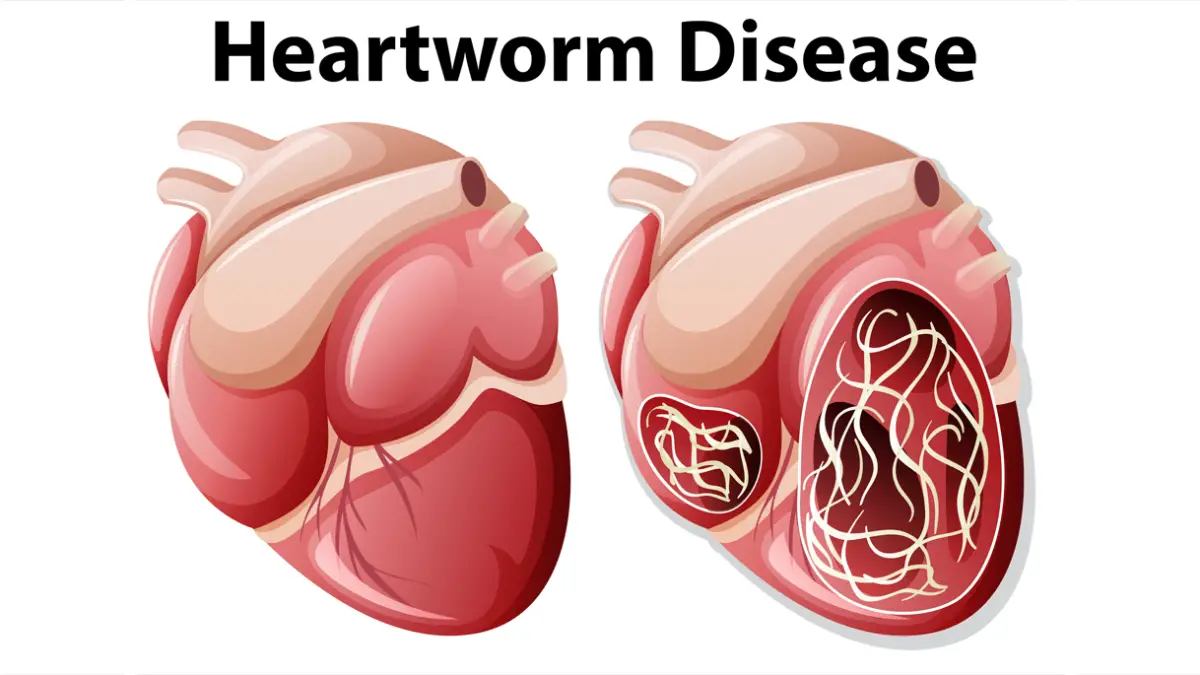Heartworm In Dogs - All You Should Know
26.11.2020.
Heartworm is a parasite that mostly attacks dogs but can be fatal for cats and ferrets as well. Dogs are their primary hosts, and if heartworm is left untreated, your dog can suffer serious consequences.
When getting a new dog, most of us focus on essential things such as raising them, training, socialization, adapting our schedule, and things like that, but we rarely think about heartworms.
If you are becoming a new dog owner, it is good that you are informing yourself about the heartworm and how to prevent it from infecting your dog. That is why we decided to let you know everything you need to know about heartworms in dogs. Let’s check it.
What is exactly a heartworm?
Heartworm is a parasitic worm called Dirofilaria immitis. Dogs are their definitive hosts, which means that these worms grow, mature, and reproduce while they are in the dog. If your dog has heartworms, they can be affected by heartworm disease.
What is heartworm disease?
It is a disease caused by the parasitic worm that lives in the infected dog’s vessels, heart, and lungs. This is a dangerous disease that can have fatal consequences if left untreated. This disease can cause severe lung damage, damage to other organs in our dog’s body, and heart failure.
How can my dog get heartworm?
For a dog to get infected by heartworms, it needs to get in contact with the intermediary parasite host. In this case, that host is the mosquito.
Mosquitos are responsible for spreading these parasites after they bite an infected dog. These parasites reproduce and send their immature worms to the dog’s bloodstream. When a mosquito bites the infected dog, it becomes the intermediary host. When the mosquito goes for the next meal and bites an uninfected dog, it infects the dog with the heartworm larvae.
Dogs are not the only species that can get infected. Coyotes, foxes, and even cats can become infected by this parasite. Coyotes and foxes play a significant role in spreading heartworm because they live close to urban areas.

How spread is heartworm disease?
Unfortunately, heartworm disease has been reported in all 50 states in the US. You will need to be extremely careful if you live in areas that are full of mosquitos. There are places close to bodies of water that make great mosquito breeding grounds. You need to regularly check your dog and make sure it doesn’t get affected by this preventable disease.
What are the symptoms of this problem?
If you think your dog might be infected by heartworms, it would be best to immediately visit your vet. It would be wise for dog owners to understand which symptoms can indicate this disease and infection.
At the beginning of the infection, dogs will show no symptoms at all, and during that period, the parasite grows and matures. Depending on the severity of the infection, scientists have divided the infection into four classes.
- Class I - This is the beginning of the infection, and during this time, there aren’t usually any symptoms. Only a mild cough may appear.
- Class II - First symptoms start to appear. The infected dog is having problems tolerating exercise and is coughing persistently.
- Class III - Infected dogs have serious trouble tolerating physical activity. Their lungs will sound weird, the dog will have a weak pulse, decreased appetite, weight loss, the dog might faint due to irregular blood flow to the brain (syncope), and can have a swollen belly because of heart failure.
- Class IV - Also known as caval syndrome. It is a life-threatening collapse of the cardiovascular system - the dog will have pale gums, breathing problems, dark brown urine, and will most likely experience organ failure and eventually death.
How to treat heartworm disease?
Treating such a severe disease might be a problem, and the recovery will be long and expensive if it is even possible. Early diagnosis is the key, and in some cases, if the disease is too developed, the therapy might not be successful.
Standard therapy is divided into four stages: Diagnose confirmation, restriction, stabilization, and killing the parasites.
- Diagnose confirmation - As we mentioned, therapy can be quite expensive, so the vet might suggest additional testing to confirm the parasite’s presence.
- Restriction - The restriction part of the therapy is aimed at restricting the dog’s activity. It might be challenging to do that, especially if you have an active breed.
- Stabilization - It is crucial that the disease is stabilized and that symptoms are under control. If there are other underlying conditions, other therapy for those conditions might be required first.
- Parasite killing - After the first three steps are done, the vet will start killing the parasites. That can be done with medication or by surgery.
Heartworm medicine
Luckily, several heartworm medications were approved by the FDA. The most effective and used ones are Immiticide, Advantage Multi for Dogs, and Diroban. These medications are injected deep into the dog’s lumbar region. It is not a pleasant process and can be quite painful.
In extreme cases, vets might recommend surgery. During that process, the vet will physically remove the parasite from the dog’s organs. It is an expensive and risky surgery that needs to be followed by testing and further medication.
Heartworm prevention
The good news is that this disease is easily preventable. Treating your dog when they are already infected can be expensive and, in some cases, unsuccessful, so prevention is a much better option.
Ask your vet for advice on heartworm and all preventive measures. Vets are usually quite strict about that, so they will most likely tell you everything you need to know even before you ask them. The heartworm prevention guidelines say the following:
- Year-round administration of a heartworm prevention medication.
- Strict compliance with the schedule of dosing recommended by your vet.
- Application of FDA-approved mosquito repellants.
- Environmental control to reduce or eliminate mosquito breeding grounds, such as pools of standing water; the use of mosquito traps; and avoiding your dog’s exposure by limiting outdoor activities at dawn and dusk, mosquitos’ prime feeding time.
If you are giving your dog the heartworm preventive medication, you are not only guarding them against heartworms, but from tapeworms, fleas, hookworms, and roundworms.
These are highly effective medications that should help you win the fight against these nasty and dangerous parasites.
World Dog Finder team








Share